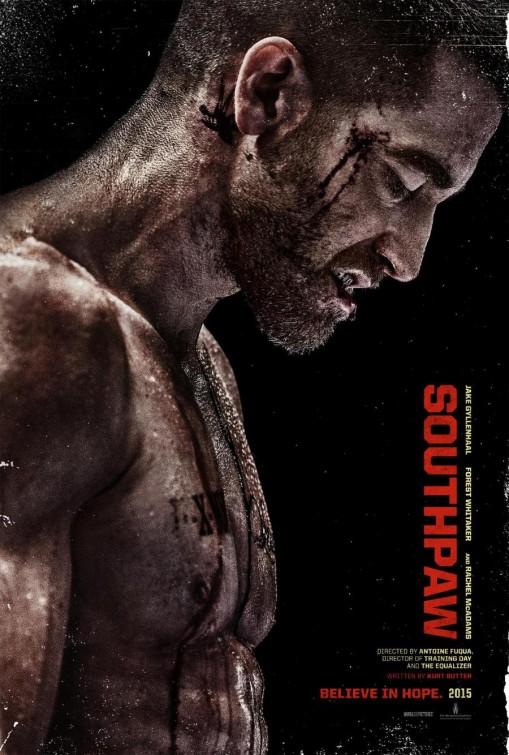Believe In Hope
Director
Antoine Fuqua
Starring
Jake Gyllenhaal
Rachel McAdams
Oona Laurence
Forest Whitaker
Curtis Jackson
To my mind there are six decent fighting films: Raging Bull, Million Dollar Baby, Cinderella Man, Warrior, The Fighter and Rocky. Everything else may have their merits but ultimately imitate and homage so much that they fail to surpass these greats. But to be fair, it’s truly difficult for a genre film to stand out from its peers and predecessors. Who doesn’t see a boxing montage and think of Rocky, or a savage life outside of the ring and recall Raging Bull? It’s only when you do something different that you achieve something great. While Southpaw does its best and offers a spectacular central performance, it delivers an acceptable but predictable bout from start to finish.
Billy Hope [Gyllenhaal] is the undefeated light heavyweight boxing champion but his methods are relatively unorthodox; in order to generate the rage to secure a win, Hope allows his opponent to administer a severe beating before properly retaliating. This stems from a tough life growing up in a New York orphanage and his success is considered a real rags to riches story. Unhappy with the increasing injuries that he is incurring, Hope’s wife Maureen [McAdams] convinces him to step away from the boxing life, if only for a while, to spend time with his young daughter, Leila [Laurence]. Whilst leaving a charity gala, raising money for the very orphanages he came from, he is confronted by a potential contender and goaded into a fistfight. In the chaos, Maureen is shot and dies in Hope’s arms (that’s not a spoiler, it’s in every trailer). Unable to cope with the death of his wife, Hope is haemorrhaging money and signs a deal for three prize fights which are lacklustre and cancelled after he assaults the referee. Due to his violent nature and intoxication (I’m going to say alleged and get back to that later) he loses his house and his daughter is placed in protective custody. With his licence suspended, Hope approaches Titus Wills [Whiatker], the owner of a small gym in a rundown part of New York, to train him but Wills has strict rules and a regimen that Hope will have to follow.
At the forefront of this film is a cluster of decent performances and two outstanding ones. But even this positive serves to highlight a very serious flaw with the film. No matter what people think of this release, you’d be hard pressed to find a critic or audience member who would slate Gyllenhaal. Excluding the physical training to get into the necessary shape to convincingly portray a boxing champion, Hope is a deeply troubled individual and bringing that across on screen without feeling trite is a task which Gyllenhaal is more than up to. However, the actual character of Hope himself is a bit hollow and to be honest, I wasn’t rooting for Billy Hope, I was rooting for Jake Gyllenhaal. Additionally, young theatre prodigy Oona Laurence brings Leila to life with more talent than a lot of her adult colleagues and consistently delivers in all respects. McAdams and Whitaker are decent enough with the material they’re given but it’s not enough to produce anything truly noteworthy. Because no matter how decent the portrayals are, they all stumble thanks to the script.
**Stupid amount of spoilers in this paragraph’s second half**
As a fan of Sons Of Anarchy, I have a fair amount of respect for Kurt Sutter but it’s evident this is a troubled script. Originally, Southpaw was written as a production for Eminem, drawing a parallel with his own life while serving as an unofficial sequel to 8 Mile. Wanting to focus on his music, Eminem left the project and the movie was transferred to a different director (and a different studio if memory serves) and the script had to be altered heavily. The title refers to left-handed boxers, which is a reference to Eminem’s own left-handedness and success in the hip hop world as a white rapper. Southpaws are a bit of an oddity in the boxing world (even to other left-handed fighters) because most fighters lead with the right, making them unpredictable and unbalanced opponents. And while this film has Hope learn to block properly and raising his shoulder as a defence, at no point does his left-handedness really come into play as much as it should, which feels like a simple loose end that was neglected in later drafts. But this issue isn’t the only random string that feels forced or underdeveloped. The film does nothing to offer any closure to the film’s major turning point: the death of Maureen. The killer is never apprehended and other than Hope seeking him out early in the film’s running time, it’s never really even mentioned again. Furthermore, we get a glimpse of the rough life Hope came from but never actually explore it. Even when Hope starts training at Willis’ Gym, learning that one of the impressionable kids has been killed by his father, it feels like a tacked on emotional spur. “Oh, by the way, Hoppy is dead. Thought you should know so you can get angrier and train harder. Doesn’t this random undeveloped character’s death motivate you to win?” What’s more, we’re led to believe that Hope has sunk into a pit of drugs and alcohol but there’s no real evidence of either. I’m not expecting to see him waking up amidst a sea of empty bottles and scattered pills but if we were supposed to get that from slurred his speech and aggressive tendencies, it’s already been established he’s an aggressive fighter who takes a lot of beatings, how can I be expected to separate that from usual behaviour? And as a final jab, midway through the story, one expositive line of dialogue is dropped to imply that, while Hope is a great fighter, his manager has been rigging certain matches. There is no other evidence of this happening and it’s never brought up again (not exactly). It doesn’t need to be spelled out bluntly for the audience but a little reinforcement of this suspicion/claim would have been appreciated.
I usually bad-mouth the crap out of James Horner but he’s achieved something fairly impressive here; aggressive and relentless at times, soft and tender at others. With no real hint of cannibalism or recycling of old themes, it’s the most un-Horner-esque score and while it doesn’t stand out as perfectly memorable, it does the job more than serviceably. In addition to the surprisingly commendable score, Fuqua has united once again with Mauro Fiore whose cinematography is an impressive mix of dark contrasts and vibrant arena set pieces. Unfortunately, the direction is standard fare but gets the job done. In Raging Bull, Scorsese created something spectacular with his direction, moving the camera in and out of the ring, through the ropes, depending on Jake LaMotta’s performance which was innovative, unique and impressive. While shot and edited nicely enough, Southpaw never demonstrates that level of skill or creativity.
Ultimately, Southpaw suffers in the same way that most biopics suffer: an extremely impressive central performance with middling technical and supporting elements. The problem is the wall-to-wall clichés mean that we all know what’s coming and how it’s going to happen, every step of the way. There are no surprises, no twist developments, just a passable script running out the clock, which is a damned shame.
Release Date:
24th July 2015
The Scene To Look Out For:
I should probably tag this as a spoiler but as I’ve mentioned earlier, this is such an obvious set piece that to call it a spoiler is a touch insulting. Having trained diligently for weeks, Hope is facing off against the man who has basically replaced him. The fight goes the full twelve rounds and just as the audience would expect, Hope summons something from deep within to impress his daughter and the honour the memory of his late wife and to restore the confidence of his grizzly trainer and blah blah and lands a perfect uppercut, taking his opponent off his feet and plummeting to the ring in sloooooow moooootioooon. We all knew it was coming but the build-up is so rushed it doesn’t connect with the intended resonance. Instead the audience just processes the information and waits for the final assessment of the match to be called so the credits can roll.
Notable Characters:
Rita Ora. I don’t know if you’re familiar with Rita Ora but she’s a singer whose name was reasonably high up in the credits list. As such I was curious what kind of role she would play in this story, what kind of character she would embody to expand her small selection of cameo appearances in other films. Oh, another cameo? Standard crack mom in a grotty flat? Great. Does she come back at all? No? Just the one minute scene? Fair enough.
Highlighted Quote:
“I have to be there. If I’m not then you can’t do it”
In A Few Words:
“Acceptable release but absolutely no deviation from the standard sports drama formula”
Total Score: 2/5
![The Red Right Hand Movie Reviews [Matthew Stogdon]](https://reviews.theredrighthand.co.uk/wp-content/uploads/2021/12/cropped-header1.png)




